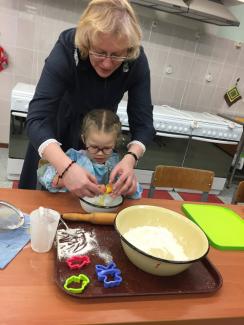Natalia Dubeshko, Head of the Department of Preschool Education and Technology at Baranovichi State University (BarSU), took part in the USAID Community Connections visitor exchange program "Teacher Preparation for Inclusive Education" in 2018. Natalia and her colleagues explored the American experience of implementing inclusion practices in Des Moines, Iowa. Based on this exchange of experiences, they created and led 'University for Children', an educational center at BarSU. Here students receive hands-on training to support children with disabilities in their educational journey.
During the trip, Natalia was incredibly impressed by the visit to the University of Iowa School of Education. "Dr. Marlene Strathe, its Director, introduced Belarusian visitors to the best practices of training future teachers and facilitating the educational process that is effective and comfortable for all: teachers, children, and their parents," says Natalia. "Our American counterparts introduced us to educational programs and training curricula for future inclusive preschool teachers, let us study the regulatory legal framework for inclusive education in preschool institutions, and showed us the physical environment of inclusive classrooms."
Natalia recalls that it was very interesting to compare the experience of teachers in Belarus with the work of their American colleagues: "We had the opportunity to communicate with teachers and students and learn about the difficulties they faced in a new educational environment: involving children in communication, playing, and learning; meeting uncooperative parents halfway, and looking for ways to support children who were unsure of themselves and their capacities. We found it very helpful to talk to the parents whose children attend these inclusive classes. A frank conversation helped us understand not only the system and techniques of working with children, but also the feelings of their families and their confidence that their child is accepted, understood, and loved."
The first thing Natalia Dubeshko and her colleague Regina Ventsel, USAID Community Connections 2017 alumna, did upon return from the United States, was to change the training programs for teachers working in inclusive education settings. Also, they organized "DA-bro", a volunteer student group. Soon, over 100 students volunteered to work with children with disabilities.
The experience of the colleagues from the University of Iowa became the blueprint for the "University for Children" project started at Baranovichi State University. Now, modern classrooms are designed to be comfortable for both pre-school children and the students working with them. The furniture meets children's physical abilities and their special needs. A sports hall has a soft surface, children's sports equipment, and equipment for sensorimotor development. There are study aids, toys, books, and sensory and arts materials for kids. Handicap accessible restrooms are available.
The 'University for Children’ project brought like-minded people together, including teachers of three university departments, and students majoring in different fields. Everyone participates on an equal footing: students assist teachers, and teachers, in their turn, actively support young people with the ideas that might seem unrealistic at first. They then help to implement these ideas as part of project activities, such as "Art-Studio", "Robotics for Kids", "Mental Arithmetic", "English for Communication", "Creative Writing for Children", "Cooking Workshop", "Plant Growing", as well as "Fitness for Kids". In the future, the Center plans to create a studio for the emotional and sensory development of children, a Lego room (a technical design workshop, or a sort of a dream room for many kids), and an educational museum, along with games and toys’ expert review lab.
Every year, the USAID Community Connections visitor exchange program provides an opportunity for 60 Belarusian professionals to develop leadership and entrepreneurship skills to increase their contributions to the social and economic development of Belarus. Since 2006, more than 700 Belarusian professionals have had a chance to explore U.S. best practices, as well as to experience American culture.

Фото предоставлено Натальей Дубешко
